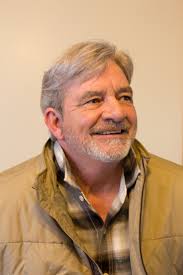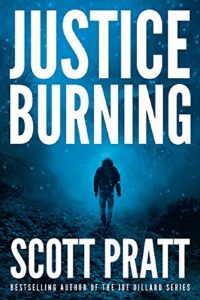Scott Pratt is the author of the bestselling Joe Dillard series of legal thrillers which has sold over a million books. A former attorney,  Scott worked as a criminal defense lawyer before writing his first novel, An Innocent Client. Although originally published by a major house, Scott decided to publish his novels independently, thus gaining control over the entire process.
Scott worked as a criminal defense lawyer before writing his first novel, An Innocent Client. Although originally published by a major house, Scott decided to publish his novels independently, thus gaining control over the entire process.
Justice Burning is the second novel in a new series featuring criminal defense attorney, Darren Street. After having spent two years in prison for a crime he didn’t commit, Darren Street—now exonerated—is trying to rebuild his practice, restore his reputation, reconnect with his son, and build a deeper relationship with attorney Grace Alexander.
Though tormented by nightmares of his prison stay, Darren is making progress until trauma strikes once again: his mother is killed in an explosion, but the police (and Darren) believe he was the intended target. Darren quickly discovers he hasn’t so easily overcome the horrors of prison and must now take matters into his own hands and face a deadly new foe.
Darren Street is a new protagonist in what is now a two-book series. What made you decide to leave Joe Dillard and take on a new series?
and take on a new series?
I haven’t left Joe, I just wanted to expand a bit. I wanted to write about an anti-hero. Though Joe has some anger issues, he’s a straight-laced guy and a family man. I wanted to write about somebody a little edgier, and a bit younger. After eight Joe Dillard books, I wanted a change. I’ve already written a third Darren Street book which will be published in February 2018. But, I’ll be going back to Joe and staying with him for a while.
There’s no courtroom scene in “Justice Burning.” The novel is very different from all your previous ones. Tell us a little about that.
I wanted to stay out of the courtroom. Darren was in such a transitional stage he wasn’t really practicing law. He’d been in prison, been released and was starting to practice, but then his mother was blown up. He’d negotiated the overwhelming trauma of being falsely convicted and imprisoned, and was starting to recover. Suddenly, he’s hit with another trauma—the violent death of his mother. It becomes a question of how much can the human psyche endure? The police basically told Darren who they thought had killed his mother. He went off the deep end and took matters into his own hands.
I wanted to make people see how a person can be so traumatized, he will abandon his usual moral code. Not wanting to return to prison, Darren became very calculating as he planned to settle the score.
It’s a huge change from the Joe Dillard books because Darren is an anti-hero.
That’s always a risk with an anti-hero, isn’t it? By definition, an anti-hero has significant character flaws.
Definitely. But just like artists don’t want to paint the same picture over and over again, and composers don’t want to write just the same kind of songs, novelists don’t want to write the same type of stories again and again. I wanted to challenge myself by tackling something quite different from the Joe Dillard series, and my editor at Thomas and Mercer encouraged me.
“Justice Burning” deals partly with the concept of justice in our legal system. What are the differences between justice, fairness, and truth.
In our system, I think justice is a gussied-up term for revenge. There may be elements of truth and some fairness, and occasionally justice or revenge is tempered with mercy.
Victims and criminals view justice very differently. Victims look at justice as, Get me some state-sanctioned revenge. Criminals view justice and say, Look at and understand what I did, and temper your revenge with mercy.
Justice is different things to different people.
Darren Street is suffering from symptoms of PTSD. As a former defense attorney, you’ve probably seen a great deal of this disorder. Tell us about the capacity of prison to evoke PTSD in inmates.
A majority of inmates suffer PTSD to some degree. Prison is a horrific experience. There are gangs where you must stay with members of your own race or ethnic group. Inmates are totally powerless. They see and experience abuses normal people cannot understand. They see guard-on-inmate violence, inmate-on-inmate violence, and inmate-on-guard violence. They see things such as superheated baby oil thrown into someone’s face. They live with the constant threat of annihilation. An inmate is constantly on guard for his life. One can get shanked for something as inconsequential as looking at someone the wrong way. It’s a Darwinian existence.
As far as politicians are concerned, the criminal justice system is a bastard stepchild. They don’t want to fund or think about it. They don’t want to reform prisoners, and the way the system is set up, they might be right. By the time someone is a hard-core criminal, that inmate’s personality is irredeemable. The inmates are simply warehoused. Once they’re released, they cannot cope with freedom.
“Justice Burning” is such a fast-paced story it could very well become a movie. Has there been Hollywood interest in either the Joe Dillard books or in the two Darrel Street books?
There’s been interest in the Joe Dillard books but so far, nothing has developed. I’ve been told the Darren Street books are more likely to generate movie interest because they’re edgier.
As a bestselling author of legal thrillers, what has surprised you about the writing life?
I’ve been surprised by how anonymous the writing life can be. I’m glad for it because I’m a private person. Nowadays, I can write a bestseller from my writing room upstairs, and it can go out on Amazon and sell very well without my having to do a single book signing or appear in public.
What’s coming next from Scott Pratt?
The ninth book in the Joe Dillard series is coming after the third Darren Street book.
Congratulations on penning “Justice Burning” a hair-raising and propulsive thriller that raises questions about the law, the penal system, revenge, and what constitutes justice.





Leave a Reply
You must be logged in to post a comment.